Region Choice Overview
Number of Schools in the Region
Elementary Schools
High Schools
Options School
Elementary School Attendance Boundaries in the Region
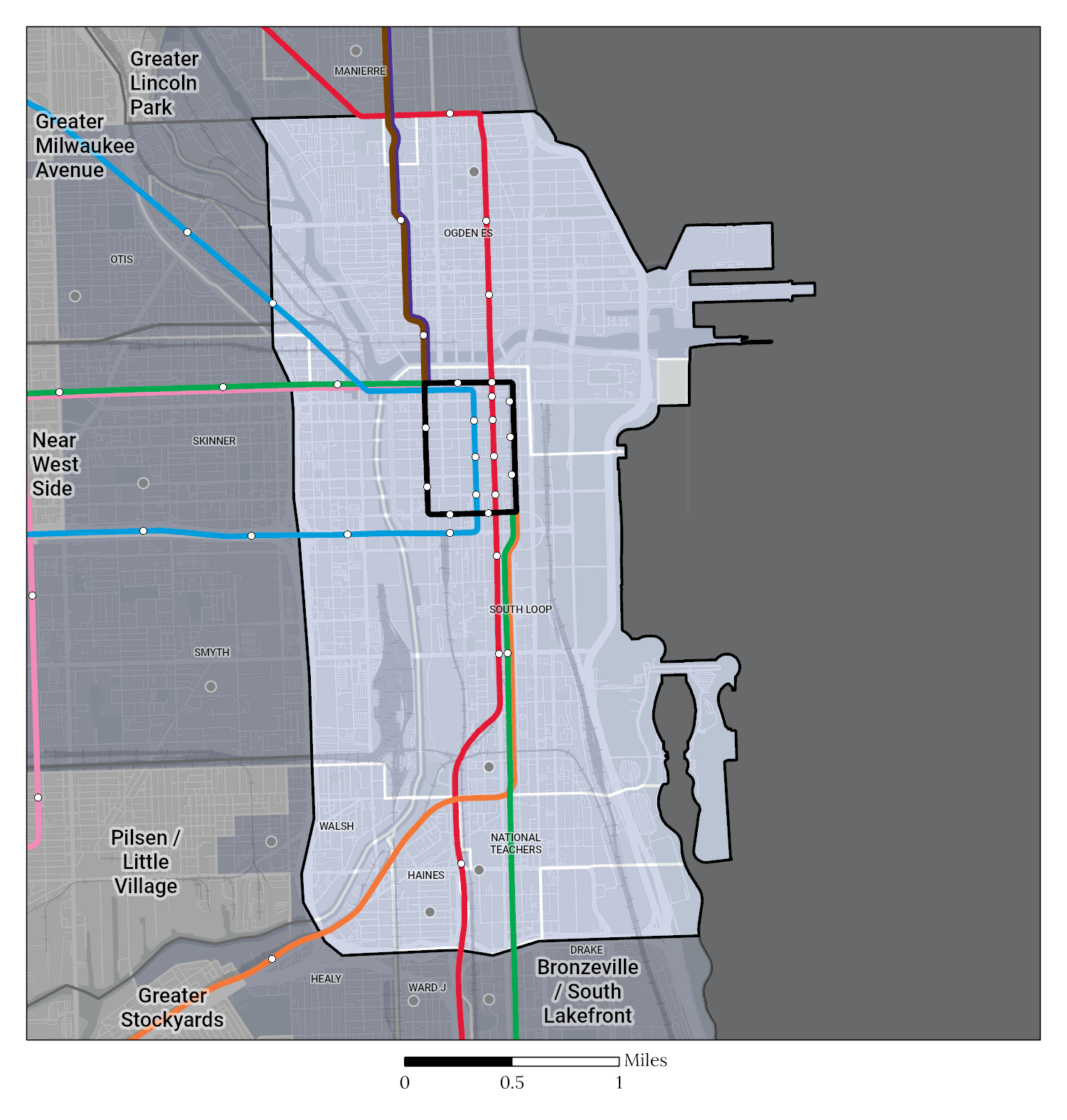
Elementary School Attendance Boundaries
NOTE: Schools in the region without attendance boundaries (citywide schools) are not shown on the attendance boundary map. Citywide schools do not have attendance boundaries and admit students through an application process.
CPS has some middle schools that serve a subset of grades K-8. Middle schools may have a dedicated attendance boundary. Only stand-alone middle schools that are not contained within an elementary school are included on this map. For more information on middle schools, use the CPS School Locator at schoolinfo.cps.edu/schoollocator/index.html to understand which schools an address is zoned to.
High School Attendance Boundaries in the Region
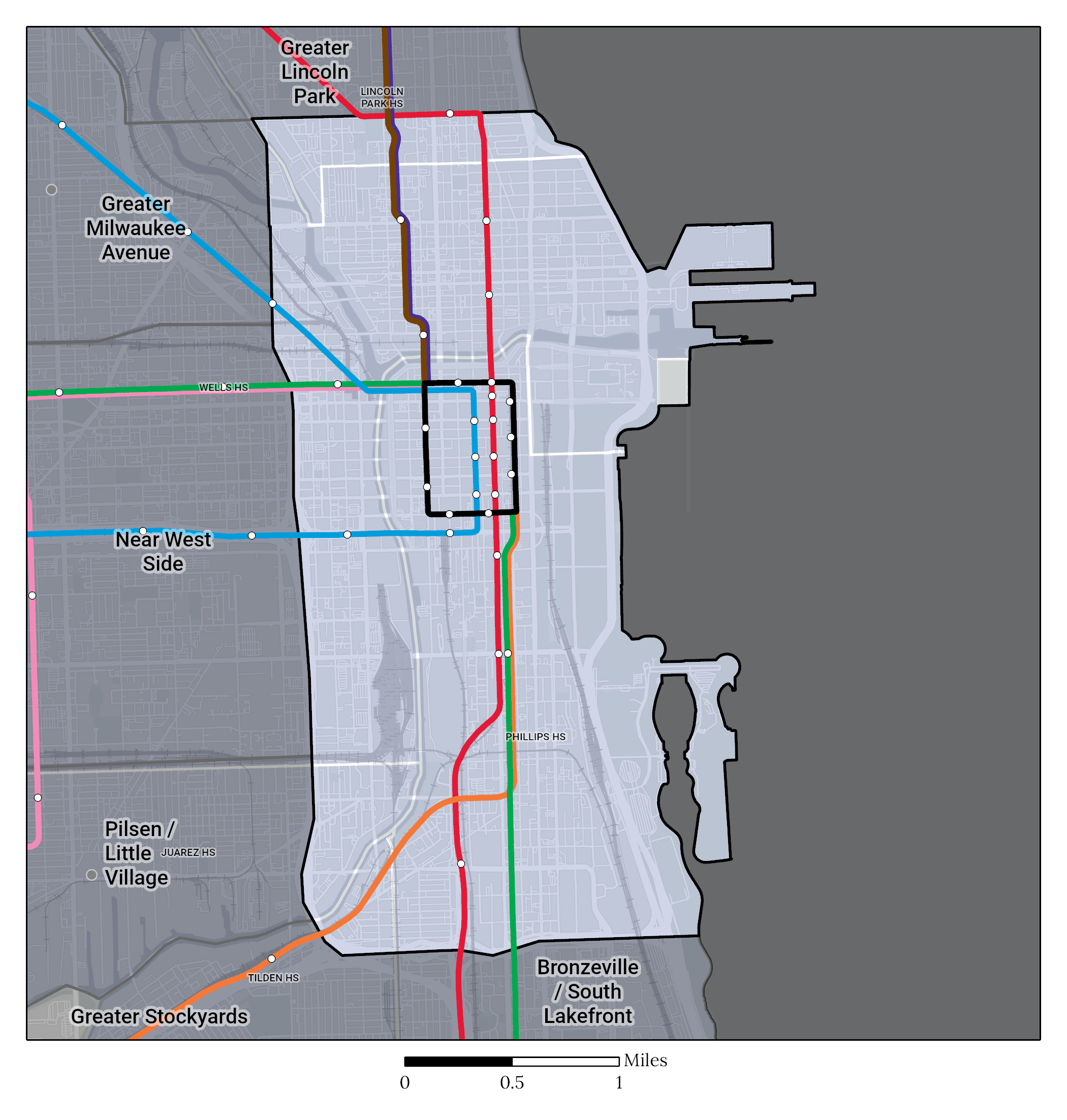
High School Attendance Boundaries
NOTE: Schools in the region without attendance boundaries (citywide schools) are not shown on the attendance boundary map. Citywide schools do not have attendance boundaries and admit students through an application process.
Options High Schools do not have attendance boundaries and students can choose to attend any Options high school within or outside of their home region.
Choice Patterns in the Region
Choice In
Students that live outside of the region and attend schools in the region
Choice Out
Students that live in the region but attend schools outside the region
Reside & Attend
Students that both reside and attend schools in the region
Are Elementary Students Choosing Schools in the Region?
Elementary School Student Choice Over Time
School choice is currently defined as choosing to attend a school that is not a student’s zoned (or assigned) school.
Over the past four years, in this region, the percent of elementary school students attending a school other than their zoned school (in or out of the region) has increased from 30% to 39%. In the same time frame, the percentage of students attending their zoned school has decreased from 70% to 61%.
The percentage of elementary school students attending a school in the Central Area region (zoned or non-zoned) has decreased from 75% to 68%, while the percentage of students attending another school out of the region has increased from 25% to 32%.
Elementary School Student Attendance Type Over Time
Elementary School Student Attendance Type Over Time
NOTE: Only K-8 grade students are included in school choice calculations as Pre-K students are not zoned to a school. Due to rounding, some charts may not add up to 100%.
Elementary School Students Who Attend School Out of Region by Race/Ethnicity
Of the 3,455 elementary students who live in the region, 32% (1,098 students) attend school outside of the region. In the region, 26% of students who identify as Black attend school outside of their home region compared to 30% of students who identify as Asian and 47% of students who identify as Latinx.
Elementary School Students Attending School Out of Region by Race/Ethnicity
Elementary School Students Attending School Out of Region by Race/Ethnicity
NOTE: Due to rounding, some charts may not add up to 100%.
Elementary School Students Who Attend a Non-Zoned School In Region
Of the 3,455 elementary students residing in the region, 7% (235 students) attend another school in the region that is not their zoned school. Of those students, 55% attend other citywide schools with the remainder attending Selective Enrollment, other zoned schools, or Charter/Contract schools in the region.
School Type of Elementary School Students Attending a Non-Zoned School In Region
School Type of Elementary School Students Attending a Non-Zoned School In Region
Elementary School Students Who Attend a Non-Zoned School Out of Region
Of the 3,455 elementary students residing in the region, 32% (1,098 students) attend another school out of the region. Of those students, 36% attend other zoned schools with the remainder attending Magnet, Selective Enrollment, Charter/Contract, or other citywide schools out of the region.
School Type of Elementary School Students Attending a School Out of Region
School Type of Elementary School Students Attending a School Out of Region
Elementary School Student's Distance and Time Traveled to School
Of the 3,455 elementary students residing in the region, 51% travel less than 1 mile for school and 21% travel 3 miles or more. 45% of students travel less than 15 minutes and 9% travel 45 minutes or more.
Elementary School Students
Distance Traveled to School
Region median: 1 mi.
District median: 0.5 mi.
Elementary School Students
Time Traveled to School
Region median: 17 min.
District median: 12 min.
Elementary School Students Distance Traveled to School
Elementary School Students Time Traveled to School
NOTE: The travel distance and time medians represent the midpoint in each group of data. The midpoint is the point where 50% of students in the region travel shorter than this distance/time and 50% travel longer than this distance/time. Using a median more fairly represents travel data and reduces the influence of extreme values such as students who attend school very far away from their home region.
Distance traveled and commute time are calculated based on the student’s home address and the address of their school. Commute distance and time was calculated using Google Maps travel estimates and includes a combination of walking and public transit data. The analysis takes into account school start times and chooses routes that minimize unnecessary travel and wait time. Any wait time before a trip starts is not included but wait times due to transfers are included.
Due to rounding, some charts may not add up to 100%.
Where are Elementary Students Choosing to Attend Outside the Region?
This map illustrates the current choice footprint of K-8th graders residing in the Central Area region but attending a school out of the region.
The Greater Lincoln Park, Greater Milwaukee Avenue, and Near West Side regions are enrolling the greatest overall number of elementary students who reside in the Central Area region but attend school out of the region.
Elementary School Choice Footprint Map
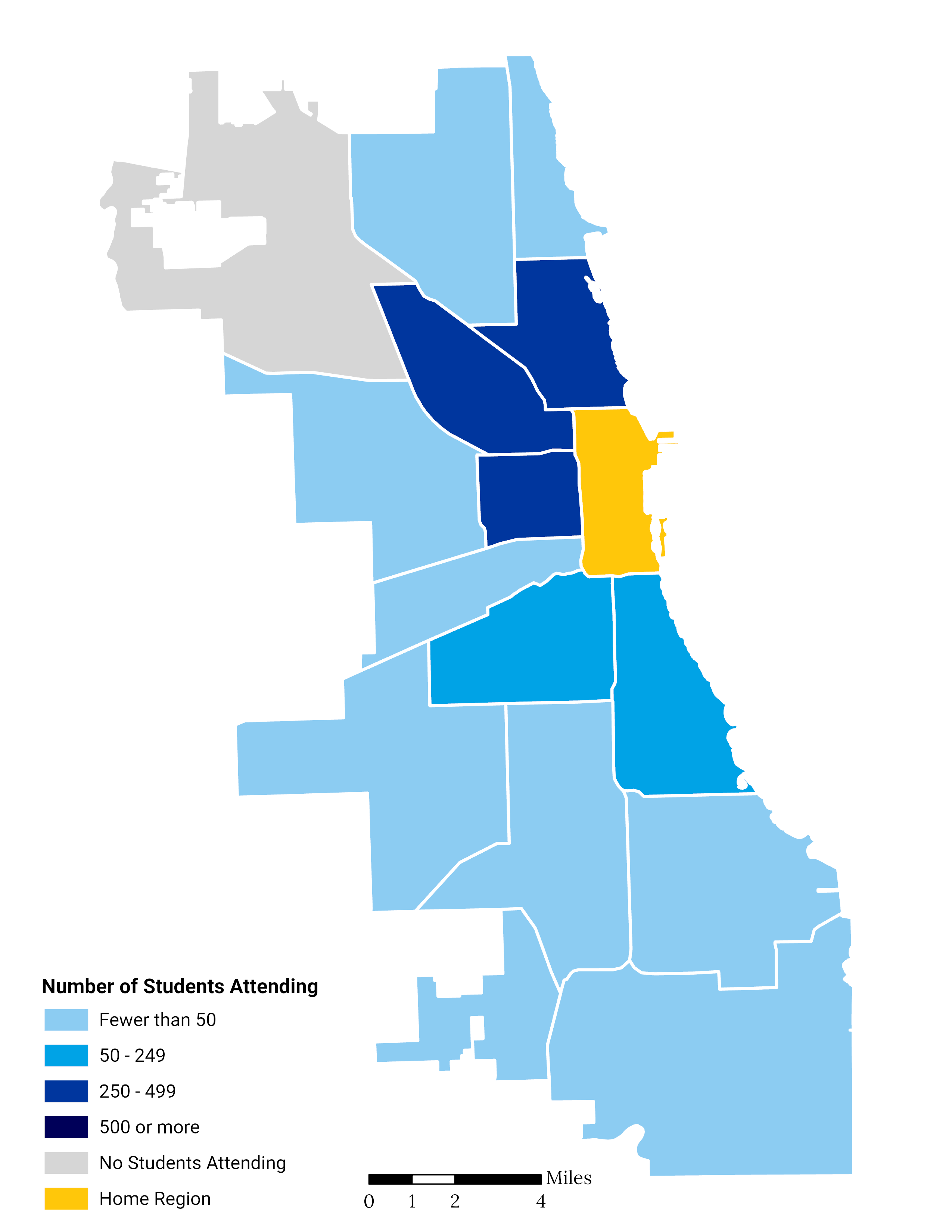
Are High School Students Choosing Schools in the Region?
Percentage of 8th Grade Students in the Region Who Applied to High School
Since 2017-18, CPS has utilized the GoCPS platform to allow students to research and apply to all high schools and high school programs. Students are asked to rank in order of preference the schools and programs they are most interested in. Students are still guaranteed a seat in the general education program at their zoned high school and do not have to submit a GoCPS application for that program. For more information about GoCPS and the high school application process, visit go.cps.edu.
In the Central Area region, 95% (320) of 8th-grade students applied to a variety of high school programs in Round 1 of the GoCPS application process.
Percent of 8th Grade Students in the Region Who Applied to High School
Percent of 8th Grade Students in the Region Who Applied to High School
Percentage of Students in the Region Who Received an Offer from One of Their Top 3 Choices
Of the 8th-grade students residing in the Central Area region who applied in Round 1, 84% received an offer to one of their top 3 choices of high school programs. This figure does not include selective enrollment high schools as those schools use a different ranking process in GoCPS.
Percent of 8th Grade Students in the Region Who Received an Offer from One of Their Top 3 Choices
Percent of 8th Grade Students in the Region Who Received an Offer from One of Their Top 3 Choices
NOTE: This analysis only includes 8th-grade applicants who were enrolled on the 20th day of school in 2023-24. Due to rounding, some charts may not add up to 100%.
Between school years 2020-21 and 2021-22 changes were made to the CPS HS admissions process. As a result, students' ranking and offer outcomes will differ overall from previous years' data.
High School Student Choice Over Time
School choice is currently defined as choosing to attend a school that is not a student’s zoned (or assigned) school.
Over the past four years, in this region, the percent of high school students attending a school other than their zoned school (in or out of the region) has decreased from 91% to 87%. In the same time frame, the percentage of students attending their zoned school has increased from 9% to 14%.
High school students attending a school in the Central Area region (zoned or non-zoned) has increased from 46% to 53%, while students attending another school out of the region has decreased from 54% to 48%.
High School Student Attendance Type Over Time
High School Student Attendance Type Over Time
NOTE: Due to rounding, some charts may not add up to 100%.
High School Students Who Attend School Out of Region by Race/Ethnicity
Of the 1,347 high students who live in the region, 48% (646 students) attend school outside of the region. In the region, 57% of students who identify as Black attend school outside of their home region compared to 41% of students who identify as Asian and 58% of students who identify as Latinx.
High School Students Attending School Out of Region by Race/Ethnicity
High School Students Attending School Out of Region by Race/Ethnicity
NOTE: Due to rounding, some charts may not add up to 100%.
High School Students Who Attend a Non-Zoned School In Region
Of the 1,347 high students residing in the region, 39% (518 students) attend another school in the region that is not their zoned school. Of those students, 86% attend Selective Enrollment schools with the remainder attending Charter/Contract or other citywide schools in the region.
School Type of High School Students Attending a Non-Zoned School In Region
School Type of High School Students Attending a Non-Zoned School In Region
High School Students Who Attend a Non-Zoned School Out of Region
Of the 1,347 high students residing in the region, 48% (646 students) attend another school out of the region. Of those students, 31% attend other zoned schools with the remainder attending Selective Enrollment, Charter/Contract, other citywide schools, Magnet, or Military schools out of the region.
School Type of High School Students Attending a School Out of Region
School Type of High School Students Attending a School Out of Region
High School Student's Distance and Time Traveled to School
Of the 1,347 high students residing in the region, 57% travel less than 3 miles for school and 10% travel 6 miles or more. 57% of students travel less than 30 minutes and 15% travel 45 minutes or more.
High School Students
Distance Traveled to School
Region median: 2.4 mi.
District median: 2.7 mi.
High School Students
Time Traveled to School
Region median: 26 min.
District median: 26 min.
High School Students Distance Traveled to School
High School Students Time Traveled to School
NOTE: The travel distance and time medians represent the midpoint in each group of data. The midpoint is the point where 50% of students in the region travel shorter than this distance/time and 50% travel longer than this distance/time. Using a median more fairly represents travel data and reduces the influence of extreme values such as students who attend school very far away from their home region.
Distance traveled and commute time are calculated based on the student’s home address and the address of their school. Commute distance and time was calculated using Google Maps travel estimates and includes a combination of walking and public transit data. The analysis takes into account school start times and chooses routes that minimize unnecessary travel and wait time. Any wait time before a trip starts is not included but wait times due to transfers are included.
Due to rounding, some charts may not add up to 100%.
Where are High School Students Choosing to Attend Outside the Region?
Choice Footprint Map
This map illustrates the current choice footprint of 9th-12th graders residing in the Central Area region but attending a school out of the region.
The Greater Lincoln Park, Greater Milwaukee Avenue, Near West Side, and Bronzeville / South Lakefront regions are enrolling the greatest overall number of high school students who reside in the Central Area region but attend school out of the region.
High School Choice Footprint Map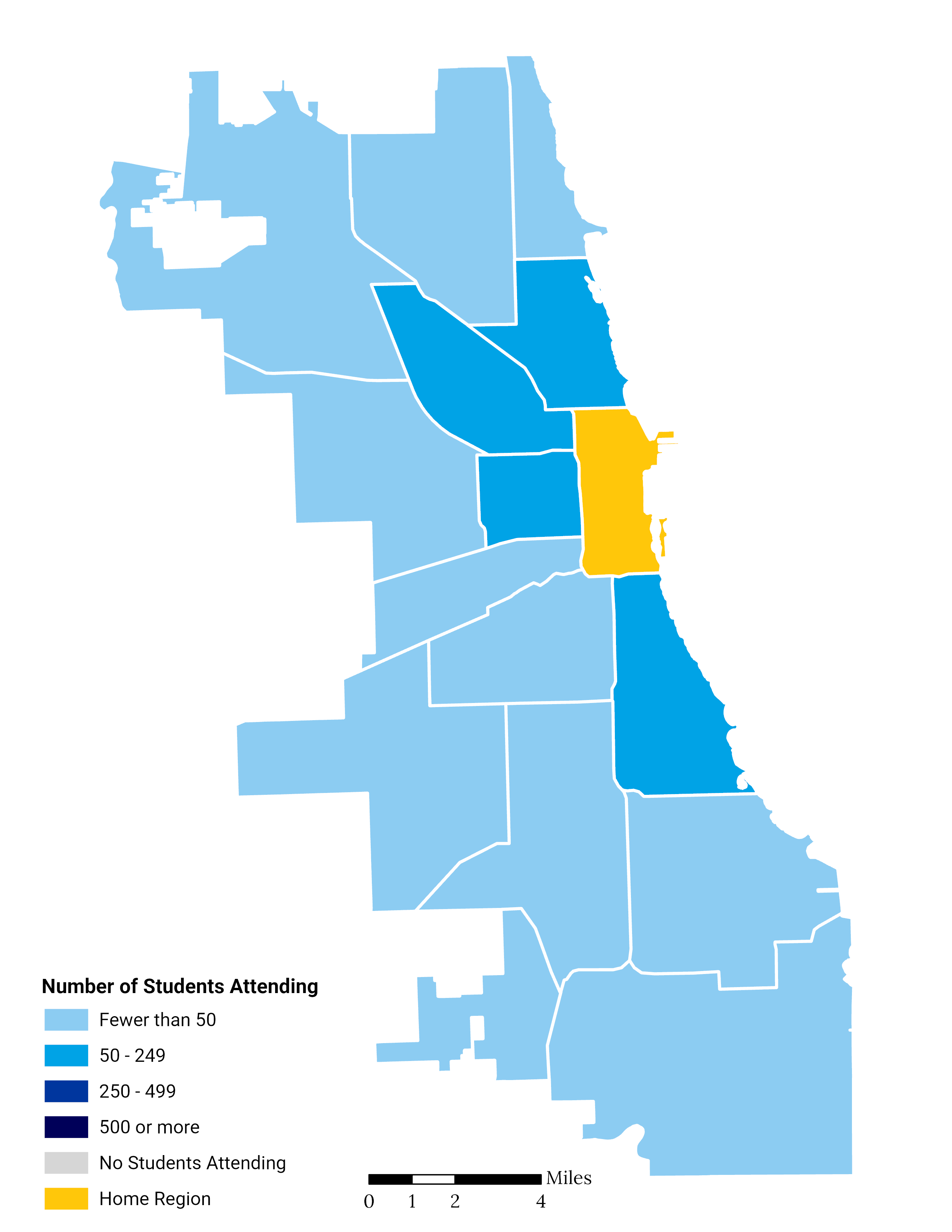
Are Options High School Students Choosing Schools in the Region?
Options High School Student Choice Over Time
Options high schools serve students who need a new pathway toward high school graduation. CPS schools offer additional supports and services for students who have been out of school and seek to return or who may need opportunities to earn credits in an accelerated program. Some of CPS’ campuses offer additional supports such as counseling and alternative schedules for students who may work during the traditional school day.
Options high schools exist in every region except the Greater Lincoln Park and Far Southwest Side regions. Options high schools do not have attendance zones or admission criteria although many serve only students 16 years and older. Students can choose to attend any Options high school within or outside of their home region. For this reason, Choice patterns tend to differ for Options students compared to elementary and other high school students.
Over the past four years, the percent of Central Area region Options high school students attending a school in the region has increased from 20% to 45%. In the Central Area region, Options high school students attend school out of the region at a greater rate than elementary students and at a greater rate than other high school students.
Options High School Student Attendance Type Over Time
Options High School Student Attendance Type Over Time
NOTE: Due to rounding, some charts may not add up to 100%.
Options High School Student's Distance Traveled to School
The median travel distance for Options high school students residing in the region is 2.2 miles to school, which is 1.2 miles less than the district median. Of the 38 Options high school students in the region, 53% travel less than 3 miles and 24% travel 6 miles or more.
Options High School Students Distance Traveled to School
Region median: 2.2 mi.
District median: 3.4 mi.
Options High School Students Distance Traveled to School
NOTE: The travel distance and time medians represent the midpoint in each group of data. The midpoint is the point where 50% of students in the region travel shorter than this distance/time and 50% travel longer than this distance/time. Using a median more fairly represents travel data and reduces the influence of extreme values such as students who attend school very far away from their home region.
Distance traveled and commute time are calculated based on the student’s home address and the address of their school. Commute distance and time was calculated using Google Maps travel estimates and includes a combination of walking and public transit data. The analysis takes into account school start times and chooses routes that minimize unnecessary travel and wait time. Any wait time before a trip starts is not included but wait times due to transfers are included.
Due to rounding, some charts may not add up to 100%.
Options High School Student's Time Traveled to School
The median travel time for Options high school students residing in the region is 31 minutes, which is the same as the district median. Of the 38 Option high school students in the region, 45% travel less than 30 minutes and 27% travel 45 minutes or more.
Options High School Students Time Traveled to School
Region median: 31 min.
District median: 31 min.
Options High School Students Time Traveled to School
NOTE: The travel distance and time medians represent the midpoint in each group of data. The midpoint is the point where 50% of students in the region travel shorter than this distance/time and 50% travel longer than this distance/time. Using a median more fairly represents travel data and reduces the influence of extreme values such as students who attend school very far away from their home region.
Distance traveled and commute time are calculated based on the student’s home address and the address of their school. Commute distance and time was calculated using Google Maps travel estimates and includes a combination of walking and public transit data. The analysis takes into account school start times and chooses routes that minimize unnecessary travel and wait time. Any wait time before a trip starts is not included but wait times due to transfers are included.
Due to rounding, some charts may not add up to 100%.
Where are Options High School Students Choosing to Attend Outside the Region?
Choice Footprint Map and Table
This map illustrates the current choice footprint of 9th-12th Options high school students residing in the Central Area region. The table shares enrollment data on Options high schools students across all regions.
All regions except the Far Northwest Side, Greater Lincoln Park, Greater Stockyards, South Side, Far Southwest Side, and Greater Calumet regions are enrolling some Options high school students who reside in the Central Area region but attend school out of the region.
Map of Options High School Locations and
Where Options High School Students Reside and Attend
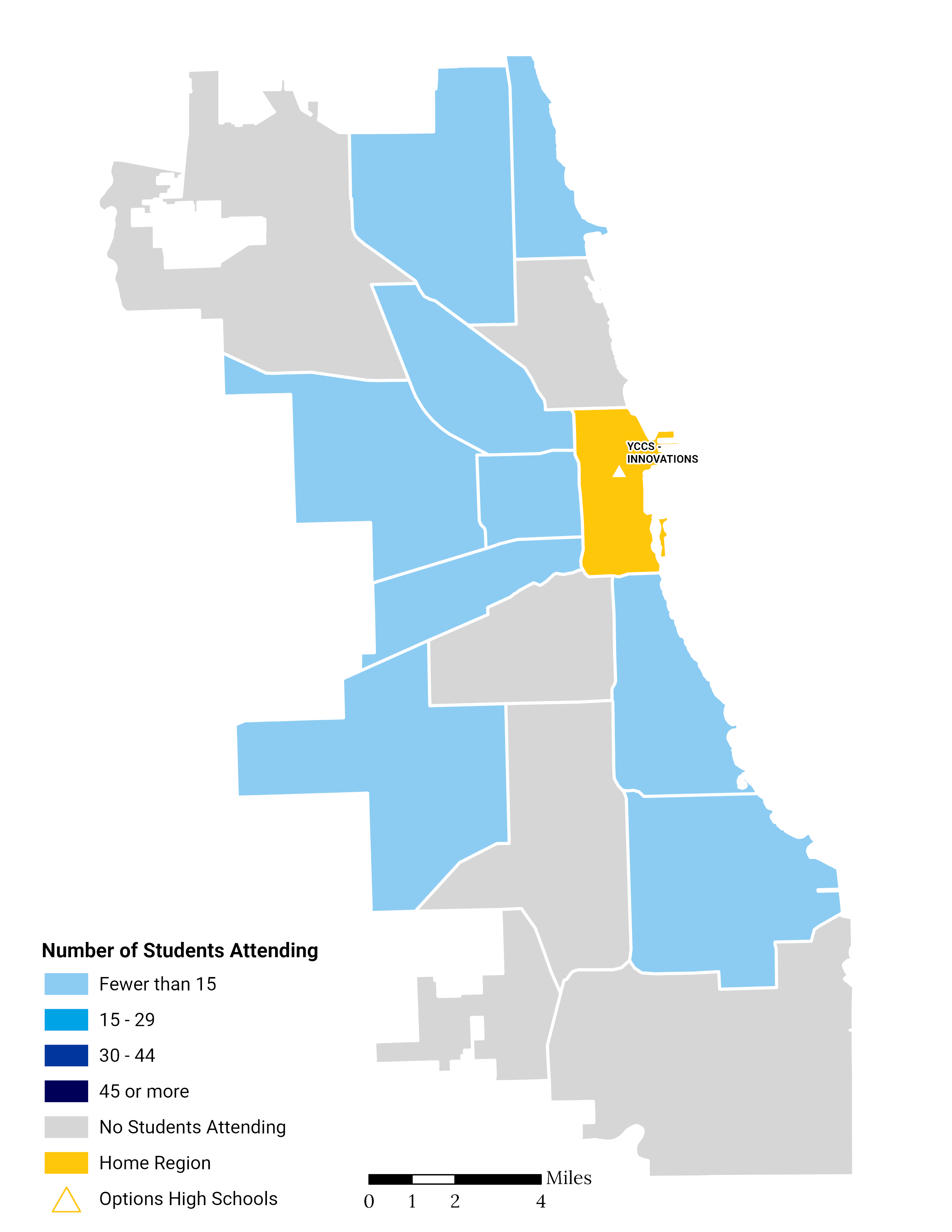
NOTE: Share of Options high school students by region is provided to show the proportion of HS students who attend an Options high school compared to all HS students who reside in that region.
Options high school students can attend school in or out of the region except for in the Far Southwest Side and Greater Lincoln Park regions which do not contain Options high schools.
Options high schools do not have attendance zones or admission criteria although many serve only students 16 years and older.
Options High School Students
